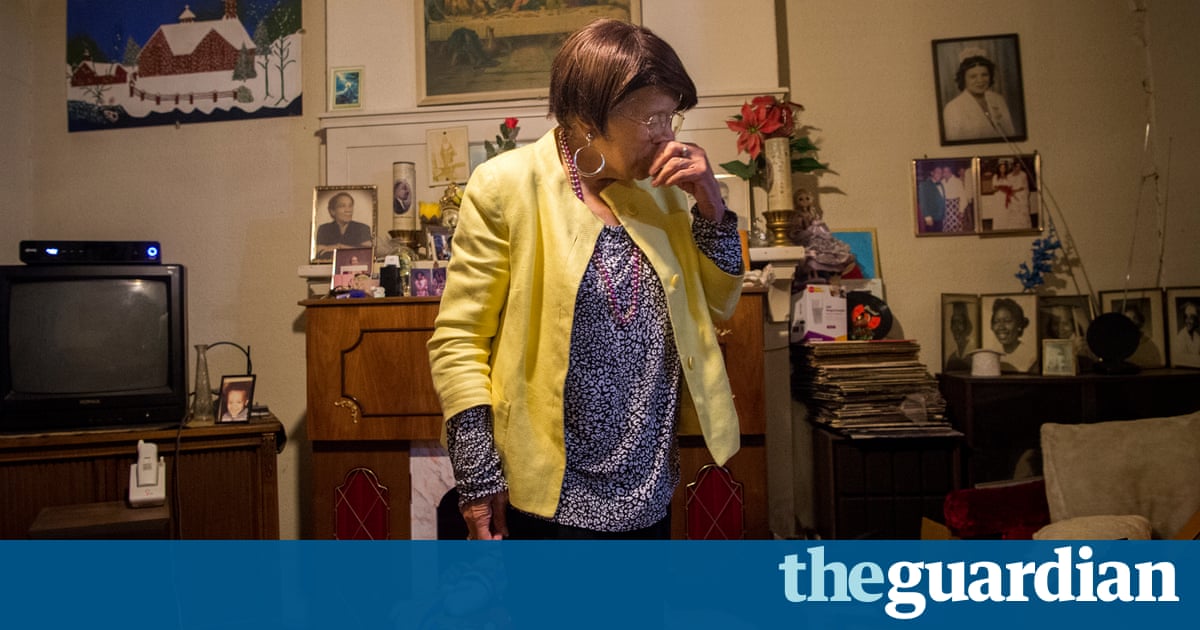‘This is killing me’: 100-year-old woman fights eviction in San Francisco

As housing prices surge in northern California and residents of color are forced from homes, Iris Canada fighting to maintain a life estate agreement

Iris Canada doesnt know if she can survive an eviction. The 100-year-old San Francisco woman has inhabited the same two-bedroom apartment for more than 50 years, but is nearing the end of a long legal battle with the property owners.
Any day now, she could face sheriffs at her door forcing her out.
All of this is killing me, she said in a recent interview in her kitchen, sitting next to a cabinet that she said her late husband had built decades earlier.
The first-story apartment on a quiet residential street is cluttered with family portraits, photo albums, artwork by her husband, and furniture that Canada said they brought from Texas when they moved to California in the 1940s.
I love my house, said Canada. This is my place. This is my furniture. Everything here is mine.
On Tuesday, her lawyers will once again ask the court to thwart the eviction one week after a judge issued a temporary stay in what was the centenarians eleventh successful request for a delay. While the property owners insist that theyve gone above and beyond to accommodate her and seek a resolution to a protracted dispute, the case has become a powerful symbol of the worsening housing crisis in California, which continues to claim the most vulnerable victims.
Severe housing shortages and homeless emergencies have strained cities and communities up and down the west coast, particularly in areas where income inequality is on the rise and low-income residents have few protections to remain in place.

Many metrics suggest San Francisco has the priciest real estate in the country, which means ordinary people cant afford to live in the city by the bay anymore, and complex legal battles often emerge from disputes over small slivers of property or land.
The affordability crisis has produced some absurd housing stories, such as a 25-year-old renting a wooden box for $400 or half of a living room renting for $1,295 a month. But its cases like Canadas longtime residents of color being forced out of homes in rapidly gentrifying neighborhoods that are most disturbing to housing advocates.
Shes a very strong woman but this really could kill her, said Tommi Avicolli Mecca, director of counseling programs with the Housing Rights Committee, a local advocacy group. Let her stay. Its the only humane thing to do.
As the number of eviction notices have continued to climb, San Franciscos black population has dwindled now less than 6% of the city, which is half of what it was 50 years ago.
The six-unit building where Canada lives is not far from the Fillmore neighborhood, an area that was once a cultural mecca for black residents, known as the Harlem of the west.
Its changed a whole lot, said Canada, who worked as a nurse and beautician.
The current owners of her unit Carolyn Radisch, her husband Peter Owens, and his brother Stephen Owens purchased the property in 2002 and eventually granted Canada a so-called life estate agreement.
Its not a traditional landlord-tenant contract, but was designed to allow Canada to remain in the apartment until she died with a fixed monthly estate payment of $700.
The owners and their attorneys have alleged that Canada eventually stopped living in the unit, instead staying with family in Oakland, and that she did not maintain the property in good condition. They claimed those actions violated the requirement that she permanently resides in the unit, and they moved forward with an eviction in 2014.
Its utterly ridiculous, said Iris Merriouns, Canadas niece who helps care for her and who has been fighting the property owners for years.
Merriouns said Canada had traveled extensively to visit family in southern California and Texas and also spent a significant amount of time with a dying niece who lived in Oakland.
She didnt want to leave her side, Merriouns said, wiping away tears during a recent interview at Canadas house. They took advantage of our familys tragedy.
Canada has also been hospitalized a number of times, including for a stroke, which is why she has been away from the home for extended periods, according to Merriouns. My aunt is allowed to travel and visit where she chooses.

Mark Chernev, the owners lawyer, insisted that Canada did not live in the apartment: She believes in her mind that thats her home. But its not her home.
During the Guardians recent visit, the apartment appeared inhabited, with dishes in the sink, food in the kitchen, and Canadas clothes and other possessions filling every room. Canada also had home visits with two therapists and a nurse while a reporter was present.
In a lengthy phone interview, Peter Owens was adamant that he never wanted to remove Canada. Owens lives on the east coast and previously worked as a housing director in Burlington, Vermont, where US senator Bernie Sanders was once mayor. After the Canada case caused a backlash in Burlington this year, Owens resigned.
Owens claimed that Merriouns had blocked Canada from signing papers that would allow the building to be converted into a condominium. He and his lawyers, along with some of the other residents in the building, have argued that a condo conversion would not affect Canadas agreement but would improve the value of the property.
Owens alleges that Merriouns was attempting to gain control of the unit.
Merriouns scoffed at the claims. Peter Owens didnt expect my aunt to live this long, she said.
All Im asking is for Iris Canada to show us the same respect we showed her, Owens said. We had every right to evict her back then, and 99% of people would have. We protected her Think about what kind of economic sacrifices weve made.
For her part, Canada said she wanted to remain in a home filled with so many sentimental valuables and memories.
Its been a long time and Id like to stay.
Read more: https://www.theguardian.com/us-news/2016/oct/03/san-francisco-100-year-old-iris-canada-eviction